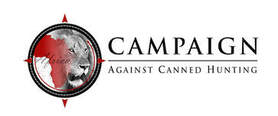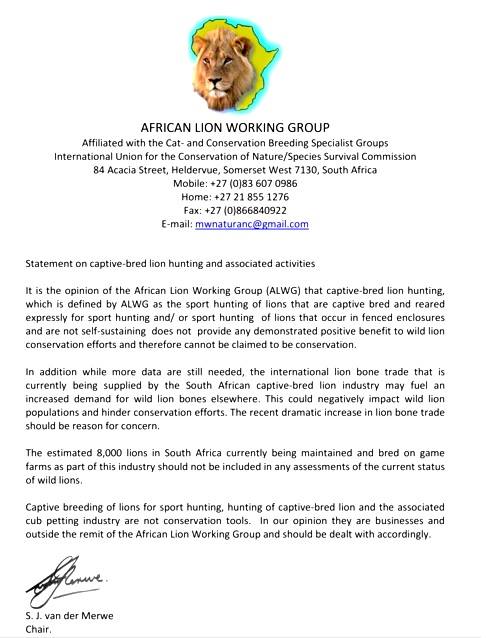News & articles about lion issues
African Lion Working Group statement on lion hunts
Canned hunting: German volunteering directory bans all lion cub projects
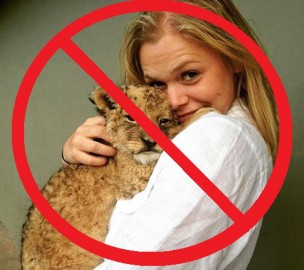
Wegweiser-freiwilligenarbeit.com
3rd November, 2015
German online-portal wegweiser-freiwilligenarbeit.com and South African NGO CACH (Campaign Against Canned Hunting) alert people that want to contribute to the conservation of endangered species in Southern Africa not to participate in lion breeding projects. Animal farms that advertise caring for supposedly orphaned big cat cubs are frequently part of the hunting industry.
Read more...
3rd November, 2015
German online-portal wegweiser-freiwilligenarbeit.com and South African NGO CACH (Campaign Against Canned Hunting) alert people that want to contribute to the conservation of endangered species in Southern Africa not to participate in lion breeding projects. Animal farms that advertise caring for supposedly orphaned big cat cubs are frequently part of the hunting industry.
Read more...
A roaring shame
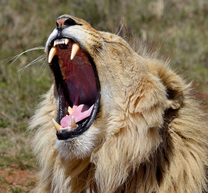
A legal analysis of the commoditisation and exploitation of lions in the commercial lion indsutry of South Africa.
By:
Ricci Goldstein
University of the Witwatersrand
Supervisor: Prof Tracy Humby
Abstract
South Africa has about 7000 lions that have been bred in captivity to be shot in captivity-and
it is completely legal. Not only is canned hunting legal in South Africa, it is a flourishing
industry, popular especially amongst those who travel from outside the continent to shoot
big game for trophy and sport. The canned hunting industry has thrived in South Africa in
large part because it is under-regulated. The government, to protect the canned hunting
industry, has adopted a strained and unrealistic definition based on inadequate permit
conditions. Worryingly this is only one aspect of the commercial lion industry that garners
criticism. Furthermore cub petting, captive breeding and the recent surge in lion bone trade
all form of a sinister cycle aimed at deriving maximum economic benefit from lions ensnared
in the industry.
Read more...
By:
Ricci Goldstein
University of the Witwatersrand
Supervisor: Prof Tracy Humby
Abstract
South Africa has about 7000 lions that have been bred in captivity to be shot in captivity-and
it is completely legal. Not only is canned hunting legal in South Africa, it is a flourishing
industry, popular especially amongst those who travel from outside the continent to shoot
big game for trophy and sport. The canned hunting industry has thrived in South Africa in
large part because it is under-regulated. The government, to protect the canned hunting
industry, has adopted a strained and unrealistic definition based on inadequate permit
conditions. Worryingly this is only one aspect of the commercial lion industry that garners
criticism. Furthermore cub petting, captive breeding and the recent surge in lion bone trade
all form of a sinister cycle aimed at deriving maximum economic benefit from lions ensnared
in the industry.
Read more...
What are the ethical issues surrounding canned hunting?
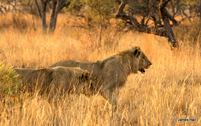
I am a grade eleven student from Adelaide, Australia and for this years school curriculum I am required to research a topic of my own choice and create a 2000 word outcome using several different sources. The topic I have chosen is on the ethical issues surrounding canned hunting as I am extremely passionate about this topic.
Lilli Cavill
Read more...
Lilli Cavill
Read more...
SA Government and critics poles apart on canned hunting
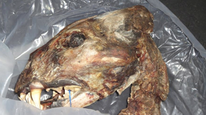
23 July 2015
The Witness
How can there be meaningful dialogue when only the Hunters Association and Predator Breeders Association are the only organisations invited to meet with Government.
Read more...
The Witness
How can there be meaningful dialogue when only the Hunters Association and Predator Breeders Association are the only organisations invited to meet with Government.
Read more...
CACH EU members go to Brussels
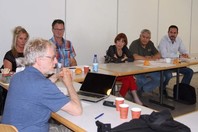
15 June, 2015
Faye Peeters CACH Germany reports
Under the Chairmanship of CACH UK Leader, David Nash, the Eurogroup members of CACH met in Brussels in order to stratagise a way forward to stop lion farming and canned hunting.
For the full report:
Read more...
Faye Peeters CACH Germany reports
Under the Chairmanship of CACH UK Leader, David Nash, the Eurogroup members of CACH met in Brussels in order to stratagise a way forward to stop lion farming and canned hunting.
For the full report:
Read more...
Can captive hunts actually save animals?

One Green Planet
By Sara Farr
28 May, 2015
The practice of hunting wild animals for food is largely considered a cruel act among animal lovers, but there is perhaps another form of hunting that is equally – if not more – cruel that has recently become the subject of many controversial debates: captive hunts.
Read more...
By Sara Farr
28 May, 2015
The practice of hunting wild animals for food is largely considered a cruel act among animal lovers, but there is perhaps another form of hunting that is equally – if not more – cruel that has recently become the subject of many controversial debates: captive hunts.
Read more...
Cuddling Cubs – Discover The Darker Side Of Big Cat “Conservation”
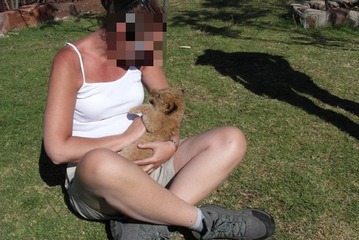
27 May, 2015
There seems to be an insatiable market for cub petting in the general public among animal lovers. Lion farmers exploit this emotional need by presenting themselves as 'wildlife sanctuaries' and tourists are easily deceived.
Please read this very good article in Projects Abroad by Samantha Evans and educate yourself, before you too are are sorry you supported such an industry.
Read more...
There seems to be an insatiable market for cub petting in the general public among animal lovers. Lion farmers exploit this emotional need by presenting themselves as 'wildlife sanctuaries' and tourists are easily deceived.
Please read this very good article in Projects Abroad by Samantha Evans and educate yourself, before you too are are sorry you supported such an industry.
Read more...
SA Government plan promotes canned lion hunting and trade
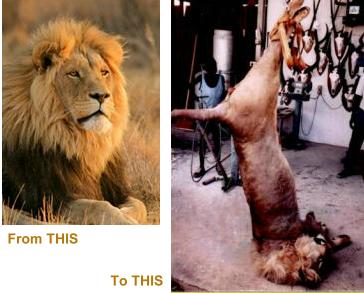
18 May, 2015
By Andreas Wilson-Späth
Motivated by lucrative financial incentives rather than by a consideration of actual conservation value, such an approach should have no place in a national biodiversity management policy. Unless challenged, this policy represents a very serious threat to the long-term survival of wild lions in South Africa and the continent as a whole.
Read more...
By Andreas Wilson-Späth
Motivated by lucrative financial incentives rather than by a consideration of actual conservation value, such an approach should have no place in a national biodiversity management policy. Unless challenged, this policy represents a very serious threat to the long-term survival of wild lions in South Africa and the continent as a whole.
Read more...
Emirates Airlines Bans Hunting Trophies of Lions, Rhinos
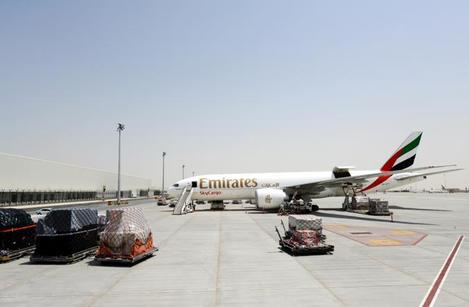
National Geographic
Paul Steyn,
14 May, 2015
The world’s biggest international carrier joins South African Airways in banning transport of trophies of exotic wildlife such as elephants and rhinos.
Emirates Airlines will stop carrying hunting trophies of elephants, rhinos, lions, or tigers on its planes, the company announced this week.
The decision is meant as a step “to eliminate illegal trade and transportation of hunting trophies worldwide and save wildlife heritage,” according to a statement from Emirates.
Read more...
Paul Steyn,
14 May, 2015
The world’s biggest international carrier joins South African Airways in banning transport of trophies of exotic wildlife such as elephants and rhinos.
Emirates Airlines will stop carrying hunting trophies of elephants, rhinos, lions, or tigers on its planes, the company announced this week.
The decision is meant as a step “to eliminate illegal trade and transportation of hunting trophies worldwide and save wildlife heritage,” according to a statement from Emirates.
Read more...
New York leads by introducing a ban on importation of African Species.

9 April, 2015
Friends of Animals
New York State Senator Tony Avella has introduced a Bill to ban the importation, possession, sale or transportation of five African species to New York – lions, leopards, elephants, and black and white rhinos.
Avella said – “New York should not be part of this trade. We can send a strong message that this is unacceptable behaviour. These five animals are in great danger due to illegal poaching and sport hunting. We must help protect them.”
If successful, the Bill will prohibit transport through New York – a major airport and seaport route of entry in to the USA.
We find allies in many places, and each one of them is willing to do what they can.
Tony Avella’s FB page is https://www.facebook.com/tonyavellaforNewYork - please take a few minutes to thank him.
Read more...
Friends of Animals
New York State Senator Tony Avella has introduced a Bill to ban the importation, possession, sale or transportation of five African species to New York – lions, leopards, elephants, and black and white rhinos.
Avella said – “New York should not be part of this trade. We can send a strong message that this is unacceptable behaviour. These five animals are in great danger due to illegal poaching and sport hunting. We must help protect them.”
If successful, the Bill will prohibit transport through New York – a major airport and seaport route of entry in to the USA.
We find allies in many places, and each one of them is willing to do what they can.
Tony Avella’s FB page is https://www.facebook.com/tonyavellaforNewYork - please take a few minutes to thank him.
Read more...
Can Lions on a Leash Help Save Endangered Big Cats?
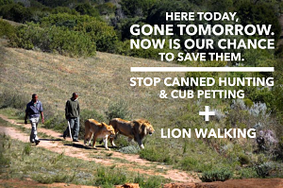
30 March, 2015
Earth Island Journal
A leading tourism operator in Zambia is planning to suspend its “lion walks,” sparking new debate.
Earlier this month, Lion Encounter Zambia announced that it has “agreed” to suspend its “lion walk” activities beginning in November 2015, a move which is being celebrated by wildlife activists in light of growing publicity linking similar activities to unethical lion breeders in the wider region, particularly in South Africa.
Read more...
Earth Island Journal
A leading tourism operator in Zambia is planning to suspend its “lion walks,” sparking new debate.
Earlier this month, Lion Encounter Zambia announced that it has “agreed” to suspend its “lion walk” activities beginning in November 2015, a move which is being celebrated by wildlife activists in light of growing publicity linking similar activities to unethical lion breeders in the wider region, particularly in South Africa.
Read more...
International Daily News wire reports on Australia ban
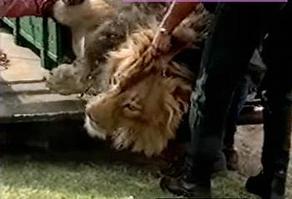
March 27, 2015
Canberra,
Australia
The Australian Government is taking action to protect African lions from what Environment Minister Greg Hunt called “the barbaric practice of canned hunting” by banning the import and export of trophies made from lions.
The announcement was made at the Global March for Lions in Melbourne earlier this month. The African lion, Panthera leo, is classed as Vulnerable to extinction by the authoritative IUCN Red List of Threatened Species.
Read more...
Canberra,
Australia
The Australian Government is taking action to protect African lions from what Environment Minister Greg Hunt called “the barbaric practice of canned hunting” by banning the import and export of trophies made from lions.
The announcement was made at the Global March for Lions in Melbourne earlier this month. The African lion, Panthera leo, is classed as Vulnerable to extinction by the authoritative IUCN Red List of Threatened Species.
Read more...
Canned hunting is not protecting wild lions!

March, 2015
Economic
Time is running out for the African Lion, the king of the jungle is fast heading towards extinction. If we are to protect their future, there can be no justification for the continued hunting of wild lions and the cruel canned hunting business should be shut down for good.
The canned hunting operators claim they are protecting the future of wild lions by breeding lions for trophy hunters, however this could not be further from the truth. Most trophy hunters are only interested in taking the skin or the head of the lion they have shot, leaving the most valuable part of the carcass, which are the bones.
Read more...
Erie TV News - 'Killing animals to save them is not conservation'
Read more here too...
Economic
Time is running out for the African Lion, the king of the jungle is fast heading towards extinction. If we are to protect their future, there can be no justification for the continued hunting of wild lions and the cruel canned hunting business should be shut down for good.
The canned hunting operators claim they are protecting the future of wild lions by breeding lions for trophy hunters, however this could not be further from the truth. Most trophy hunters are only interested in taking the skin or the head of the lion they have shot, leaving the most valuable part of the carcass, which are the bones.
Read more...
Erie TV News - 'Killing animals to save them is not conservation'
Read more here too...
Conservation’s biggest con job
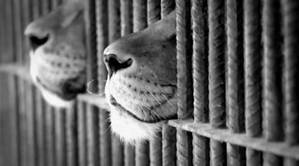
20 March, 2015
Mail & Guardian
Alison Westwood
That foreign governments need to legislate to combat South Africa’s unscrupulous practices is eerily reminiscent of the past. As Terri Stander, DA deputy spokesperson for environmental affairs, asks: “How is it possible that the international community cares more about our wildlife than we do?”
South Africa’s lion hunting industry has little to do with conservation and everything to do with profit but it seems only foreign governments care.
Read more...
Mail & Guardian
Alison Westwood
That foreign governments need to legislate to combat South Africa’s unscrupulous practices is eerily reminiscent of the past. As Terri Stander, DA deputy spokesperson for environmental affairs, asks: “How is it possible that the international community cares more about our wildlife than we do?”
South Africa’s lion hunting industry has little to do with conservation and everything to do with profit but it seems only foreign governments care.
Read more...
Majestic hunters hunted

Randburg Sun
Sammi-Jo Botha,
Group Editor
Jhb North West Branch
JOBURG – Semi-tame lions are being killed for fun
Rhino poaching has been a major problem in South Africa with hundreds of rhinos being killed for their horns in the past few years.
But recently, there has been another, equally frightening, issue that has become more prevalent in SA. This is canned lion hunting.
Read more...
Sammi-Jo Botha,
Group Editor
Jhb North West Branch
JOBURG – Semi-tame lions are being killed for fun
Rhino poaching has been a major problem in South Africa with hundreds of rhinos being killed for their horns in the past few years.
But recently, there has been another, equally frightening, issue that has become more prevalent in SA. This is canned lion hunting.
Read more...
SA Conservation officials continue to deny that the lion bone trade is killing wild lions
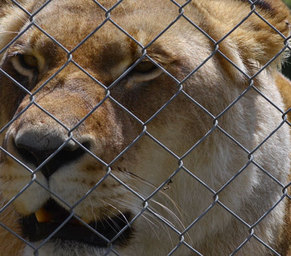
Oxpeckers
Investigative Wildlife Journalism
Fiona McCloud
Officials turn a blind eye to the smuggling of wild lions
South African farmers are using cattle-rustling routes in the Northern Cape to smuggle wild lions and other predators out of Botswana to supply a growing demand for lion-bone potions in the Far EastConservationists said the illicit trade by organised cartels was adding to the pressures that could see the extinction of big cats in the wild within 10 to 12 years. They denounced Environment Minister Edna Molewa’s response to parliamentary questions that a moratorium on lion-bone exports from South Africa was unnecessary because they do not pose a threat to the survival of the species in the wild.
Dereck Joubert, leader of National Geographic’s Big Cats Initiative, said the lion-bone market was adding to the “emergency situation” facing Africa’s wild lions — the population has crashed from about 200 000 in the 1970s to less than 20 000 today.
Read more...
Investigative Wildlife Journalism
Fiona McCloud
Officials turn a blind eye to the smuggling of wild lions
South African farmers are using cattle-rustling routes in the Northern Cape to smuggle wild lions and other predators out of Botswana to supply a growing demand for lion-bone potions in the Far EastConservationists said the illicit trade by organised cartels was adding to the pressures that could see the extinction of big cats in the wild within 10 to 12 years. They denounced Environment Minister Edna Molewa’s response to parliamentary questions that a moratorium on lion-bone exports from South Africa was unnecessary because they do not pose a threat to the survival of the species in the wild.
Dereck Joubert, leader of National Geographic’s Big Cats Initiative, said the lion-bone market was adding to the “emergency situation” facing Africa’s wild lions — the population has crashed from about 200 000 in the 1970s to less than 20 000 today.
Read more...
Africa Geographic explores the conservation myth of walking with lions
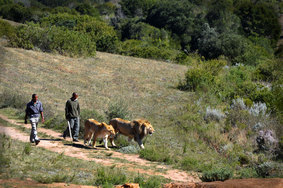
Feb, 2015
Is walking with lions good conservation?
Close encounters with Africa’s megafauna is an irresistible magnet for many tourists in Africa, and for some the closer the encounter the greater the thrill.
So when a tourism operator offers the chance, for a fee, to ‘walk with lions’ it is no surprise that there is a steady flow of punters eager to do it. And when it is claimed that the money goes towards an elaborate project purporting to rewild lions, it seems, superficially at least, to be a Good Thing.
Read more... http://africageographic.com/blog/walking-with-lions-good-conservation-probably-not/
Is walking with lions good conservation?
Close encounters with Africa’s megafauna is an irresistible magnet for many tourists in Africa, and for some the closer the encounter the greater the thrill.
So when a tourism operator offers the chance, for a fee, to ‘walk with lions’ it is no surprise that there is a steady flow of punters eager to do it. And when it is claimed that the money goes towards an elaborate project purporting to rewild lions, it seems, superficially at least, to be a Good Thing.
Read more... http://africageographic.com/blog/walking-with-lions-good-conservation-probably-not/
CBS news interview Kevin Richardson
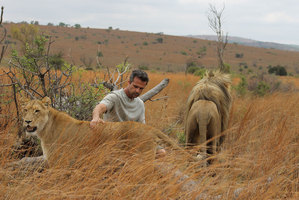
60 Minutes, CBS news journey to South Africa to interview Kevin Richardson and expose the Lion Park's activities in the canned hunting industry
30 Nov, 2015
Watch 60 Minutes on CBS news in USA to see the dramatic exposure of Lion Parks in South Africa that pose as sanctuaries.
Watch the promo video here...
http://www.cbsnews.com/videos/from-pets-to-prey/
30 Nov, 2015
Watch 60 Minutes on CBS news in USA to see the dramatic exposure of Lion Parks in South Africa that pose as sanctuaries.
Watch the promo video here...
http://www.cbsnews.com/videos/from-pets-to-prey/
New EU Permit System Fails to Protect Lions
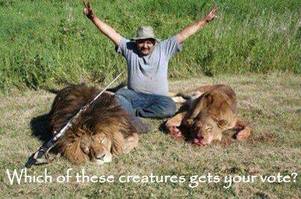
Why does the mainstream media publish official announcements so un-critically? And confuse intentions with results?
Chris Mercer
Feb, 2015
Despite what you have read about the EU ‘cracking down’ on lion trophy imports, in fact this is just a meaningless layer of bureaucracy. Talk to good CITES officials (there are some!) and they’ll tell you that all they do when a hunter wants to import a lion trophy is to refer the request to ‘Scientific Services.’ This august body will throw the request back at them saying ‘issue the import permit because there is no evidence that canned lion hunting in SA is adversely impacting wild lion populations.’
So nothing will change. Mainstream media yet again fail to get the true story.
Read more...
Chris Mercer
Feb, 2015
Despite what you have read about the EU ‘cracking down’ on lion trophy imports, in fact this is just a meaningless layer of bureaucracy. Talk to good CITES officials (there are some!) and they’ll tell you that all they do when a hunter wants to import a lion trophy is to refer the request to ‘Scientific Services.’ This august body will throw the request back at them saying ‘issue the import permit because there is no evidence that canned lion hunting in SA is adversely impacting wild lion populations.’
So nothing will change. Mainstream media yet again fail to get the true story.
Read more...
Breeding factory for trophy hunters
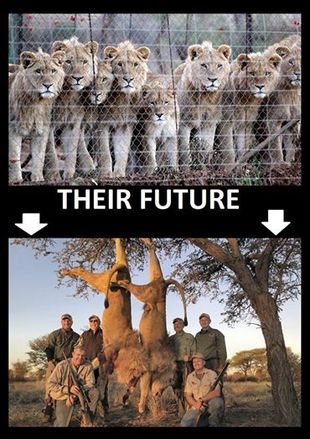
Lions and tigers from Port Elizabeth's Seaview Predator Park are being sold to game farms known for hunting and the exporting of animal bones
Gareth Wilson
9 Sep, 2014
Last week, Somyo responded to questions by the DA's chief whip in Bhisho, Bobby Stevenson, regarding the transportation of lions and tigers in and around South Africa.
Read more...
Gareth Wilson
9 Sep, 2014
Last week, Somyo responded to questions by the DA's chief whip in Bhisho, Bobby Stevenson, regarding the transportation of lions and tigers in and around South Africa.
Read more...
The end of the game
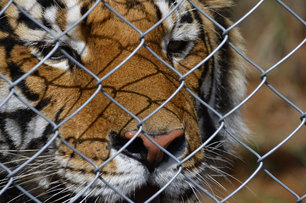
It is the end of the game for South Africa’s wildlife
Chris Mercer
To understand how lions and rhino and all other formerly wild animals, including exotic species such as tigers, have become domestic livestock, just look at the state of government in S.A.
Read more...
Chris Mercer
To understand how lions and rhino and all other formerly wild animals, including exotic species such as tigers, have become domestic livestock, just look at the state of government in S.A.
Read more...
EU wildlife trafficking input
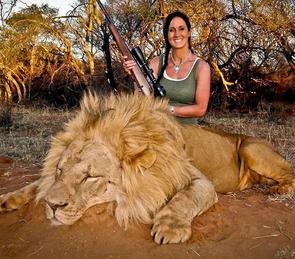
Consultation response to the communication from the commission to the Council and the European Parliament on the EU approach against wildlife trafficking
Chris Mercer
No. Without a shadow of a doubt the current policy and legislative framework is not only inadequate but part of the problem. It assumes that the range state (i.e. African country) is un-corrupt, efficient and that conservation services are actually functional.
Read more...
Chris Mercer
No. Without a shadow of a doubt the current policy and legislative framework is not only inadequate but part of the problem. It assumes that the range state (i.e. African country) is un-corrupt, efficient and that conservation services are actually functional.
Read more...
How trophy hunters destroy conservation
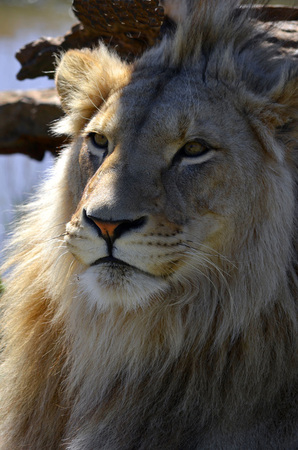
This is the first in a series of articles aimed at showing how wealthy American hunters are a force for evil in the third world
Chris Mercer
Their hunting dollars pervert conservation policies in vulnerable third world countries, instigating and perpetuating evils such as captive lion breeding and canned hunting.
Read more...
Chris Mercer
Their hunting dollars pervert conservation policies in vulnerable third world countries, instigating and perpetuating evils such as captive lion breeding and canned hunting.
Read more...
American hunters abuse US foreign aid

Hunting, along with dealing in wildlife trophies, has been banned in Kenya since 1977
Chris Mercer
Trophy hunting was accurately described by the new Kenyan democratic government as ‘a barbaric relic of colonialism.’
Unfortunately, other assaults on wildlife have been at work.
Read more...
Chris Mercer
Trophy hunting was accurately described by the new Kenyan democratic government as ‘a barbaric relic of colonialism.’
Unfortunately, other assaults on wildlife have been at work.
Read more...
Hunting a threat to our national interests
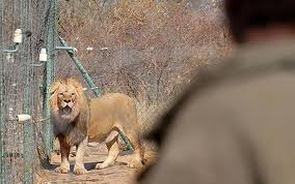
How the hunting industry is a threat to our National interests
Chris Mercer
Even though hunting is a major threat to our wildlife heritage, it is remarkable that no decision has ever been made in South Africa, that impacts adversely upon hunting. This is because conservation is heavily influenced, if not controlled, by an elite multinational group of hunters, who I regard as environmental terrorists. Thanks to them, South Africa remains a colony, with our heritage being plundered remorselessly.
Read more...
Chris Mercer
Even though hunting is a major threat to our wildlife heritage, it is remarkable that no decision has ever been made in South Africa, that impacts adversely upon hunting. This is because conservation is heavily influenced, if not controlled, by an elite multinational group of hunters, who I regard as environmental terrorists. Thanks to them, South Africa remains a colony, with our heritage being plundered remorselessly.
Read more...
Mero Motu to kill lions
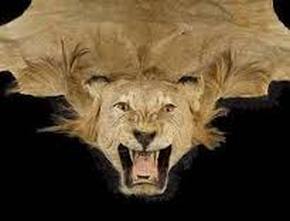
Connect the dots how the canned hunting could contribute to the extinction of wild lions
Chris Mercer
Allow me to connect the dots to explain how the decision of the S.A. Supreme Court of Appeal (SCA) in the canned hunting case could contribute to the extinction of wild lions in S.A.
Read more...
Chris Mercer
Allow me to connect the dots to explain how the decision of the S.A. Supreme Court of Appeal (SCA) in the canned hunting case could contribute to the extinction of wild lions in S.A.
Read more...
TOPS regulations input

The Department of the Environment has published amendments to the Threatened or Protected Species( TOPS) regulations (and given the public 60 days to file comment. 60 Days ending 15th June 2013.)
Chris Mercer
Campaign Against Canned Hunting, the NGO that has spent more than a decade exposing the abuses of lion farming and canned lion hunting, has extracted from the 101 page document those provisions that affect lions and comments upon them below.
Read more...
Chris Mercer
Campaign Against Canned Hunting, the NGO that has spent more than a decade exposing the abuses of lion farming and canned lion hunting, has extracted from the 101 page document those provisions that affect lions and comments upon them below.
Read more...
Proposed amendments to TOPS regulations
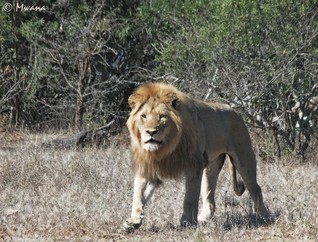
Threatened or Protected Species Regulations (TOPS)
Chris Mercer
Members of the public are invited to submit to the Minister, within 60 (sixty) days after the publication of the notice in the Gazette, written comments or inputs to the following addresses:
By e-mail: [email protected] or by fax to: (012) 320 7026
Read more...
Chris Mercer
Members of the public are invited to submit to the Minister, within 60 (sixty) days after the publication of the notice in the Gazette, written comments or inputs to the following addresses:
By e-mail: [email protected] or by fax to: (012) 320 7026
Read more...
Inform yourself
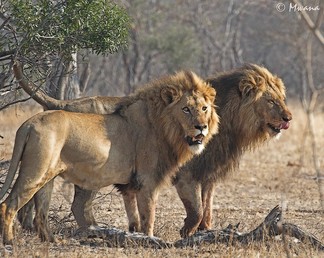
What You Don’t Know:
A World Without Lions
10 August, 2014
Brenna
To understand the problem behind this idea I had of cuddling adorable lion cubs, you have to have a little bit of an understanding about the current status of lions.
Lions are everywhere -- depicted on popular branding and logos, emblazoned on our clothes, sitting outside buildings as stone facades, on children’s books and in movies. They have become cultural icons across the world and are easily one of the first and most identifiable animals we learn to recognize at an early age.
Read more...
A World Without Lions
10 August, 2014
Brenna
To understand the problem behind this idea I had of cuddling adorable lion cubs, you have to have a little bit of an understanding about the current status of lions.
Lions are everywhere -- depicted on popular branding and logos, emblazoned on our clothes, sitting outside buildings as stone facades, on children’s books and in movies. They have become cultural icons across the world and are easily one of the first and most identifiable animals we learn to recognize at an early age.
Read more...
